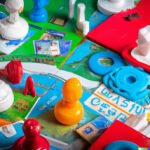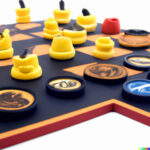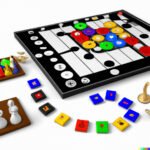Dice strategy board games have been a beloved pastime for centuries, combining the thrill of chance with the strategic thinking required to outmaneuver opponents. Whether it’s the roll of the dice or the placement of pieces, these games are a test of skill and tactics, making them a favorite among casual players and serious enthusiasts alike.
In this article, we will delve into the world of dice strategy board games, exploring their history, popular choices, key elements, and tips for developing a winning strategy. Additionally, we’ll examine the role of luck in these games and how they impact cognitive skills. We will also touch upon the community and competitive aspects of these games, as well as discuss trends and innovations that may shape their future.
So join us on this journey through the captivating realm of dice strategy board games, where luck meets strategy and every move counts. Whether you’re a seasoned player or new to the scene, there’s something here for everyone to enjoy and learn from.
History of Dice Strategy Board Games
The history of dice strategy board games dates back to ancient civilizations such as the Egyptians and the Romans, who used dice for both entertainment and strategic gameplay. The early versions of these games were rudimentary, often involving simple moves based on the roll of a die. Over time, however, these games evolved to incorporate more complex strategies, making them an enduring form of entertainment across different cultures and time periods.
One of the earliest known examples of a dice strategy board game is the ancient Indian game known as Pachisi, which is still played today in its modern incarnation as Ludo. This game involves moving pieces around a cross-shaped board based on the throw of six or seven cowrie shells, which act as dice. Similarly, backgammon is another classic example of a dice strategy game with an extensive history, dating back over 5,000 years to Mesopotamia.
As civilizations developed and interacted with one another through trade and conquest, so too did their games evolve. For example, many believe that European knights returning from the Crusades brought back variations of chess and backgammon from Asia and the Middle East. These two-player games became popular among nobility in Europe during the Middle Ages and Renaissance periods.
| Game | Origin |
|---|---|
| Pachisi/Ludo | Ancient India |
| Backgammon | Mesopotamia (modern-day Iraq) |
Popular Dice Strategy Board Games
Dice strategy board games have been a popular pastime for both casual and avid gamers alike. These games offer a unique blend of luck and skill, making them appealing to a wide audience. Some of the most popular dice strategy board games include Settlers of Catan, Risk, and Yahtzee, among others.
Settlers of Catan is a resource management game that requires players to strategically build roads, settlements, and cities on the island of Catan. With dice rolling determining resource production, players must carefully plan their moves to outmaneuver their opponents and claim victory.
Risk is another beloved game that involves both luck and strategy. Players take on the role of leaders aiming to conquer the world by engaging in battles and strategic alliances. With dice rolls determining the outcome of battles, players must calculate risks and make strategic decisions to achieve global domination.
Yahtzee is a classic dice game that combines luck with strategic thinking. Players roll five dice to form different combinations like three-of-a-kind or full house. The challenge lies in deciding which combination to aim for based on the current roll and maximizing points through shrewd decision-making.
These popular dice strategy board games offer an enjoyable mix of chance and skill, providing hours of competitive fun for players of all ages. Whether through diplomatic negotiations in Risk or tactical planning in Settlers of Catan, these games continue to captivate audiences with their engaging gameplay.
Key Elements of Dice Strategy Board Games
Dice strategy board games are a unique genre that combines the use of dice with strategic decision-making. These games require players to not only rely on luck but also to develop a winning strategy based on the roll of the dice.
One key element of these games is the use of different types of dice, each with their own specific function and impact on gameplay. Understanding how to effectively utilize these dice types is crucial in mastering dice strategy board games.
Another important element is the game board itself. The layout and design of the board can greatly influence the strategy and tactics that players employ. Some boards may have specific areas or zones that provide advantages or disadvantages based on the roll of the dice, adding another layer of complexity to the game.
In addition, various game components such as cards, tokens, and player pieces contribute to the overall experience of dice strategy board games. These elements often have specific functions or abilities that can be activated through strategic decision-making, further enhancing the depth and complexity of gameplay.
Overall, mastering these key elements is essential for success in dice strategy board games. Players must be able to adapt their strategies based on the ever-changing dynamics of dice rolls and game components in order to outmaneuver their opponents and achieve victory.
| Element | Description |
|---|---|
| Dice Types | Each type has a specific function impacting gameplay |
| Game Board | Layout influences player strategy and tactics |
| Game Components | Cards, tokens, and player pieces with unique functions |
Tips for Developing a Winning Strategy
When it comes to dice strategy board games, developing a winning strategy is crucial for success. Whether you’re playing classics like backgammon or modern games like Settlers of Catan, having a solid game plan can greatly increase your chances of victory. In this section, we’ll explore some tips and strategies for honing your skills and improving your gameplay in dice strategy board games.
Understand the Game Rules and Mechanics
The first step in developing a winning strategy for any dice strategy board game is to thoroughly understand the rules and mechanics of the game. Take the time to familiarize yourself with the specific objectives, win conditions, and any special rules or abilities that may come into play. Understanding how different elements interact and influence each other will give you a solid foundation for building an effective strategy.
Observe Your Opponents
Observing your opponents’ moves and tactics can provide valuable insight into their strategies and help you anticipate their next moves. Pay attention to their decision-making process, patterns, and tendencies during gameplay. By understanding how others approach the game, you can adjust your own strategy accordingly to gain an advantage.
Adaptability Is Key
Flexibility and adaptability are essential components of a winning strategy in dice strategy board games. As luck plays a significant role in these games due to the element of chance with dice rolls, being able to adjust your plans on the fly is crucial. Stay open-minded and be prepared to modify your tactics based on the changing circumstances during gameplay.
By implementing these tips for developing a winning strategy, you can enhance your skills and increase your chances of success in various dice strategy board games. Remember that practice makes perfect, so don’t hesitate to apply these strategies in your next gaming session.
Understanding the Role of Luck in Dice Strategy Board Games
Dice Strategy Board Games are a unique genre of board games that combine elements of luck and strategic thinking. Understanding the role of luck in these games is crucial to success, as players must learn how to make calculated decisions while also accepting the influence of chance.
Luck vs. Strategy
One of the defining aspects of Dice Strategy Board Games is the balance between luck and strategy. While players can develop winning strategies based on the available options and potential outcomes, they must also contend with the unpredictable nature of dice rolls. This dynamic creates an exciting and challenging gameplay experience that appeals to both casual and serious gamers.
Managing Luck
Successfully managing luck in Dice Strategy Board Games requires adaptability and resilience. Players must be prepared for unexpected outcomes while also maximizing opportunities presented by favorable dice rolls. This combination of proactive decision-making and flexibility in response to chance events sets these games apart from pure strategy or luck-based games.
Embracing Uncertainty
Ultimately, understanding the role of luck in Dice Strategy Board Games means embracing uncertainty as an integral part of the gameplay. By recognizing the impact of chance on their decisions, players can refine their strategies to account for potential variations in outcomes, adding depth and complexity to their gaming experience.
How Dice Strategy Board Games Impact Cognitive Skills
Dice strategy board games are more than just a form of entertainment – they also have a significant impact on cognitive skills. These games require players to think critically, plan ahead, and make strategic decisions, all of which contribute to the development and improvement of cognitive abilities. Here are some ways in which dice strategy board games can impact cognitive skills:
- Problem-solving: Dice strategy board games often present players with complex challenges that require them to think analytically and come up with creative solutions.
- Decision-making: Players must make strategic decisions based on the roll of the dice and the current state of the game, which helps to enhance their decision-making abilities.
- Memory: Many dice strategy board games involve remembering rules, strategies, and past moves, which can help improve memory retention and recall.
Furthermore, research has shown that engaging in these types of games can also have a positive impact on other cognitive skills, such as attention span, concentration, and logical reasoning. The mental stimulation provided by dice strategy board games can be especially beneficial for individuals of all ages.
In addition to the direct impact on cognitive skills, playing these types of games can also have long-term benefits for brain health. By regularly exercising their minds through strategic gameplay, individuals may experience improved mental agility and reduced risk of cognitive decline as they age. As a result, the appeal of dice strategy board games extends beyond mere entertainment value to encompass potential cognitive benefits as well.
Community and Competitive Aspects of Dice Strategy Board Games
Dice strategy board games have gained popularity not only for their engaging gameplay but also for the sense of community and competition they foster among players. Whether it’s a small gathering of friends or a larger gaming event, these games have the ability to bring people together and create a competitive yet friendly atmosphere. Here are some aspects that contribute to the communal and competitive nature of dice strategy board games:
- In-person gatherings: Dice strategy board games often require players to gather around a table, roll dice, and strategize their moves in real time. This in-person interaction allows for socializing, friendly banter, and shared experiences among players.
- Tournaments and events: Many enthusiasts of dice strategy board games participate in tournaments and organized events where they can test their skills against others. These competitions often attract a passionate community of players who share a love for the game and enjoy the thrill of facing off against worthy opponents.
- Online communities: With the rise of digital platforms, players have been able to connect with others who share their interest in dice strategy board games through online forums, social media groups, and gaming websites. These virtual communities provide an avenue for discussing strategies, sharing tips, and organizing online matches with fellow enthusiasts from around the world.
The combination of social interaction, shared experiences, and healthy competition makes dice strategy board games not only an enjoyable pastime but also a means of building strong community ties among players. Whether it’s fostering friendships during casual game nights or engaging in high-stakes tournaments, these games have a way of bringing people together in pursuit of strategic victory.
The Future of Dice Strategy Board Games
In conclusion, the future of dice strategy board games looks bright, with an increasing interest in these games and a growing community of players. The evolution of technology has also led to innovations in the digital versions of these games, providing more accessibility and convenience for enthusiasts. Additionally, the incorporation of new gameplay mechanics, themes, and storytelling elements is expected to further enhance the gaming experience.
As more people recognize the cognitive skills and strategic thinking involved in dice strategy board games, there is a likelihood of continued growth in the popularity of these games. Furthermore, the competitive nature of these games fosters a sense of community among players, leading to a vibrant and supportive gaming environment. This will likely result in more organized tournaments and events dedicated to dice strategy board games.
With ongoing advancements and developments, it is clear that dice strategy board games have a promising future ahead. Enthusiasts can look forward to exploring new trends and innovations that will further enrich their gaming experience. As these games continue to evolve and attract a wider audience, they are set to remain a beloved pastime for many who enjoy engaging in intellectually stimulating gameplay.
Frequently Asked Questions
What Is the Board Game With Dice on Table Boards?
The board game with dice on table boards is called “Risk.” In this game, players use dice to determine the outcome of battles as they try to conquer territories and continents.
What Board Game Have Dice in It?
A popular board game that includes dice is “Monopoly.” Players roll the dice to move around the game board, purchase properties, and collect rent from opponents.
What Is the Board Game Where You Upgrade Dice?
The board game where you upgrade dice is “Roll for the Galaxy.” In this game, players start with basic dice and can upgrade them to improve their abilities throughout the game.

I love playing all kinds of games – from classics like Monopoly to modern favourites like Ticket to Ride.
I created this blog as a way to share my love of board games with others, and provide information on the latest releases and news in the industry.





